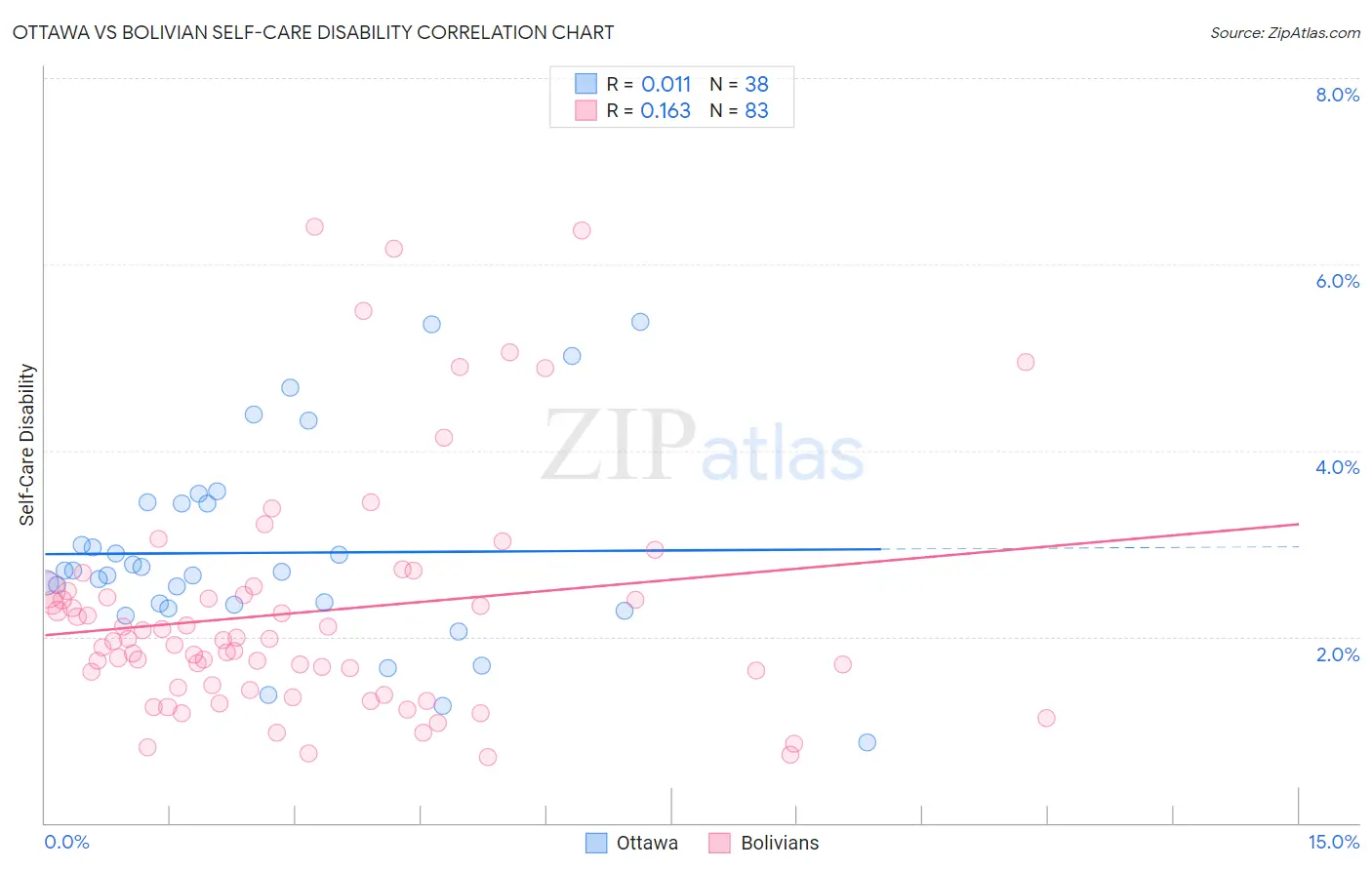Ottawa vs Bolivian Self-Care Disability
COMPARE
Ottawa
Bolivian
Self-Care Disability
Self-Care Disability Comparison
Ottawa
Bolivians
2.7%
SELF-CARE DISABILITY
0.1/ 100
METRIC RATING
278th/ 347
METRIC RANK
2.2%
SELF-CARE DISABILITY
100.0/ 100
METRIC RATING
8th/ 347
METRIC RANK
Ottawa vs Bolivian Self-Care Disability Correlation Chart
The statistical analysis conducted on geographies consisting of 49,939,429 people shows no correlation between the proportion of Ottawa and percentage of population with self-care disability in the United States with a correlation coefficient (R) of 0.011 and weighted average of 2.7%. Similarly, the statistical analysis conducted on geographies consisting of 184,600,652 people shows a poor positive correlation between the proportion of Bolivians and percentage of population with self-care disability in the United States with a correlation coefficient (R) of 0.163 and weighted average of 2.2%, a difference of 24.3%.

Self-Care Disability Correlation Summary
| Measurement | Ottawa | Bolivian |
| Minimum | 0.86% | 0.71% |
| Maximum | 5.4% | 6.4% |
| Range | 4.5% | 5.7% |
| Mean | 2.9% | 2.3% |
| Median | 2.7% | 2.0% |
| Interquartile 25% (IQ1) | 2.3% | 1.5% |
| Interquartile 75% (IQ3) | 3.4% | 2.5% |
| Interquartile Range (IQR) | 1.1% | 1.0% |
| Standard Deviation (Sample) | 1.1% | 1.3% |
| Standard Deviation (Population) | 1.0% | 1.3% |
Similar Demographics by Self-Care Disability
Demographics Similar to Ottawa by Self-Care Disability
In terms of self-care disability, the demographic groups most similar to Ottawa are Immigrants from Ukraine (2.7%, a difference of 0.080%), Iroquois (2.7%, a difference of 0.10%), Hispanic or Latino (2.7%, a difference of 0.12%), Japanese (2.7%, a difference of 0.14%), and Yakama (2.7%, a difference of 0.27%).
| Demographics | Rating | Rank | Self-Care Disability |
| Trinidadians and Tobagonians | 0.1 /100 | #271 | Tragic 2.7% |
| Immigrants | Laos | 0.1 /100 | #272 | Tragic 2.7% |
| Mexicans | 0.1 /100 | #273 | Tragic 2.7% |
| Yakama | 0.1 /100 | #274 | Tragic 2.7% |
| Immigrants | Trinidad and Tobago | 0.1 /100 | #275 | Tragic 2.7% |
| Japanese | 0.1 /100 | #276 | Tragic 2.7% |
| Immigrants | Ukraine | 0.1 /100 | #277 | Tragic 2.7% |
| Ottawa | 0.1 /100 | #278 | Tragic 2.7% |
| Iroquois | 0.1 /100 | #279 | Tragic 2.7% |
| Hispanics or Latinos | 0.1 /100 | #280 | Tragic 2.7% |
| Immigrants | Iraq | 0.0 /100 | #281 | Tragic 2.7% |
| Apache | 0.0 /100 | #282 | Tragic 2.7% |
| Delaware | 0.0 /100 | #283 | Tragic 2.7% |
| Fijians | 0.0 /100 | #284 | Tragic 2.7% |
| Jamaicans | 0.0 /100 | #285 | Tragic 2.7% |
Demographics Similar to Bolivians by Self-Care Disability
In terms of self-care disability, the demographic groups most similar to Bolivians are Immigrants from Bolivia (2.2%, a difference of 0.050%), Immigrants from Nepal (2.2%, a difference of 0.14%), Filipino (2.2%, a difference of 0.26%), Zimbabwean (2.2%, a difference of 0.51%), and Sudanese (2.2%, a difference of 1.4%).
| Demographics | Rating | Rank | Self-Care Disability |
| Yup'ik | 100.0 /100 | #1 | Exceptional 1.9% |
| Immigrants | India | 100.0 /100 | #2 | Exceptional 2.0% |
| Thais | 100.0 /100 | #3 | Exceptional 2.1% |
| Immigrants | Singapore | 100.0 /100 | #4 | Exceptional 2.1% |
| Zimbabweans | 100.0 /100 | #5 | Exceptional 2.2% |
| Filipinos | 100.0 /100 | #6 | Exceptional 2.2% |
| Immigrants | Bolivia | 100.0 /100 | #7 | Exceptional 2.2% |
| Bolivians | 100.0 /100 | #8 | Exceptional 2.2% |
| Immigrants | Nepal | 100.0 /100 | #9 | Exceptional 2.2% |
| Sudanese | 100.0 /100 | #10 | Exceptional 2.2% |
| Immigrants | South Central Asia | 100.0 /100 | #11 | Exceptional 2.2% |
| Immigrants | Ethiopia | 100.0 /100 | #12 | Exceptional 2.2% |
| Ethiopians | 100.0 /100 | #13 | Exceptional 2.2% |
| Luxembourgers | 100.0 /100 | #14 | Exceptional 2.2% |
| Okinawans | 100.0 /100 | #15 | Exceptional 2.2% |